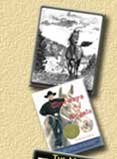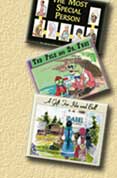
Michael's Monthly Column "Throwing My Loop"
Throwing My Loop…
By: Michael Johnson
THE “ELIZA PROBLEM”
Around the time of the birth of Christ, the Roman
poet, Ovid, wrote a story – several in fact. He called his
work The Tenth Book of Metamorphosis. Something
happened in his later years that caused Ovid to be banished
from Rome, and he spent the last ten years of his life in
exile and in sadness. Ovid’s only consolation was that he
predicted his stories would be remembered beyond his life,
and read wherever the Roman name was known. He was right.
Over 2,000 years later, his work remains – and I’m glad it
does. He has helped me greatly in life…and helped my horses
as well.
In one tale, Ovid tells of a sculptor named Pygmalion
who carved a statue of a woman. Pygmalion did such a good
job, he fell in love with his creation. Venus came along
and took pity on the poor fellow, and changed the statue
into a living thing. Galetea, as she was known, came into
being and the tale unwinds the moral and message of this
powerful work - that something wonderful can come from a
thing that appears at first glance to have no value. What a
lesson for us all.
In 1912, the Irish playwright, George Bernard Shaw,
popularized the notion of Ovid’s tale with his play called
Pygmalion. In this modernized version, Professor
Henry Higgins, reaches down into the soul of the young
urchin girl, Eliza Dolittle, and helps her become more than
she ever dreamed. Shaw pinpoints the center of the target
regarding how we help those assigned to our care with his
memorable adaptation. We can in fact, assist others in
finding and achieving a new and better path of living. Do
you know a parent, teacher, or horseman who doesn’t want to
learn how to do exactly that?
At a recent educational conference, a teacher asked a
profound and important question about the process of
“helping.”
“Is it possible that we are doing a disservice to the
child?” she asked.
“How do you mean?” I answered.
And the teacher replied, “Well, while I feel compelled
to help the child become all they can be, I sense some real
hesitation on the part of the student at times. Some
complain that if they begin to do well, they may lose old
friends. Some say if they make good grades, they are looked
down on by their former social group. And then, there’s
another problem. As a teacher, I must help the person
“become.” That’s what I’m for. But after I have helped
this person perform at a higher level, it is very unlikely
the “achievers” or “successful” students will accept this
newcomer into their social circle. This is exactly what
happened to Eliza in the play. Her old friends thought she
had become “snooty” and was putting on airs. And the more
elite social group laughed at Eliza because they saw her as
a Cockney girl with no breeding. Poor Eliza – after all her
hard work – is now left alone.”
She paused a moment, and continued, “My work is to help
children, but am I unintentionally doing them a disservice
by causing them to lose acceptance in both groups? As
helpers, should we be concerned with what we might call “The
Eliza problem?”
What a good question.
Over the past few weeks, that question has grown in my mind
and consumed a good portion of my thinking. Philosophers
have said, “The trick is to fall in love with the
question.” I have fallen in love with that one, and here is
my answer…
We should be concerned with the Eliza problem, but not
for the reasons we might think initially. We should be
concerned because the Eliza problem – being rejected by
those closest to us when we strive to do better – not only
happens to young students, but to every single one of us as
well. Was there ever a time in your life when you made a
decision to do better, become more, or try a new thing, and
you were criticized for it? For most of us, I’m
betting there was just such a time. It happens to our
children as well. That’s why we should be concerned with
the Eliza problem.
If the young roper commits to rope the dummy one
hundred times a day for a year, it’s a dead lock cinch he or
she will rope better at the end of the year. It’s also a
cinch they will be required to find new partners. If the
golf prodigy commits to hit 300 balls a day for months, you
can bet one of his peers will say something like, “I thought
we were doing this for fun. Why are you playing with the
better players instead of our old group?” And naturally,
this will happen in the classroom. Should any student make
a concerted effort to improve his or her grades, the old C,
D, and F crowd will discourage such an act. “Why are you
kissin’ up to the teacher all of a sudden?” And you can bet
if you try to improve your horsemanship skills, the biggest
“cowboy” in the group is going to laugh at you, and claim
your “getting’ all fancy on us.”
Not the real horseman of course. Not the real friend,
not the good coach or real mentor. They will never say
discouraging things when you are attempting to do more,
become better, or trying to do a new thing. The true
helpers will be right there with you - encouraging you and
telling you that you can. Surround yourself with those
positive souls. What should we
do about the Eliza problem? My little Momma had the
answer.
“There are two kinds of people in the world,” she
said. “Anchors on your tails, and wind in your sails.
Cut the anchors loose! If anyone is ever unhappy about
your good efforts or jealous of your success, treat them
with the kindness of Jesus…and get away from them!”
Over 2,000 years ago, Ovid predicted he would be read wherever the Roman name was known – and he was right. His words have floated across the centuries and found their way to a horse farm in Oklahoma. Because of the poet’s call for us to become more, Shine is better and so am I. Ovid also advised the journey takes courage. Reminds me of an old quote I always loved…
Courage does not always roar. Sometimes, it’s a quiet voice at the end of the day, saying, “I will try again tomorrow.”
Michael's latest release, Reflections Of A Cowboy, is currently available in audio book form. The two volume set consists of articles, essays and excerpts from radio performances about good people and good horses in the life of an Oklahoma cowboy. Approximately 8 hours in length. Reflections Of A Cowboy in printed form is scheduled for release in the summer of 2005.
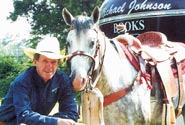 |
|||||
|
|
|||||
|
|||||
|
|
|||||
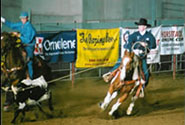 |
|||||
|
Michael heading for the great Sonny Gould |
|||||
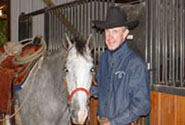 |
|||||
|
Michael & Blue |
|||||
|
Healing Shine |
|||||
 |
|
Please stop |
|
|
|
Send Michael |
Michael Johnson Books
michaelspeaks@msn.com
1172 CR 4122 Campbell, Texas 75422 (903) 862-2082

webmaster
pswope@candw-webmasters.com

